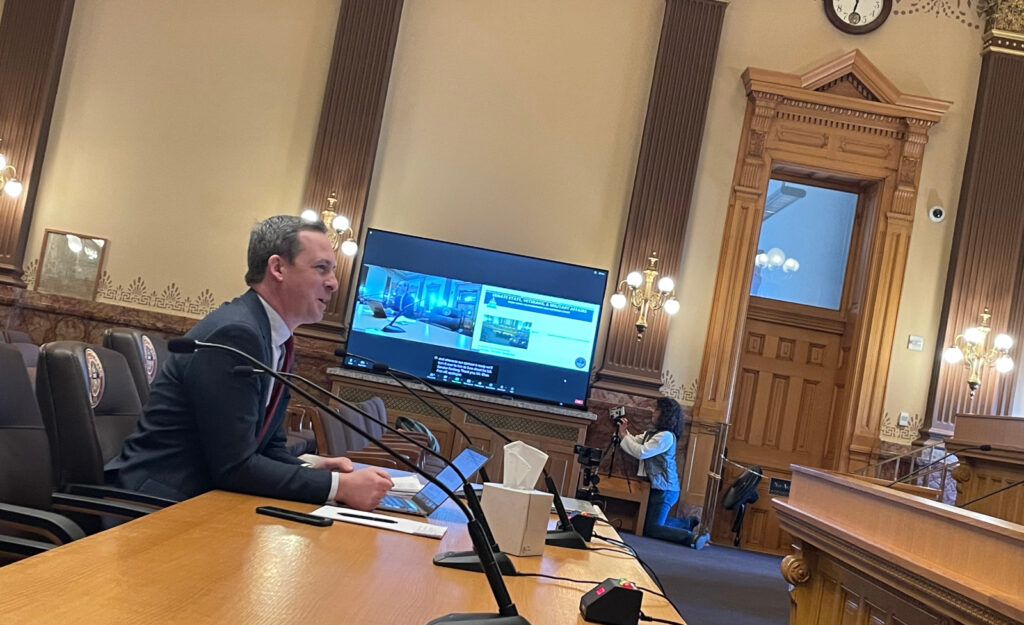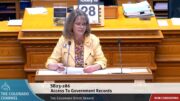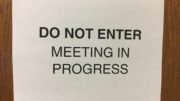Update: The House preliminarily approved SB 24-157 on Friday, Mar. 8.
By Jeffrey A. Roberts
CFOIC Executive Director
A committee of state senators Wednesday endorsed major changes to the way the open meetings law affects the Colorado General Assembly, approving a bill that narrows the definition of “public business” and lets lawmakers communicate by email and text message without it being a “meeting” under the law.
“The purpose of this bill was never to reduce transparency in any way,” said Senate President Steve Fenberg, the sponsor of Senate Bill 24-157, responding to concerns raised by groups including the Colorado Freedom of Information Coalition.

The legislature has been sued twice in the past year over Colorado Open Meetings Law issues, with a judge ruling in January that its use of an anonymous “quadratic voting” system to rank bills violated the statute and the House agreeing last September to bar representatives from auto-deleting instant messages exchanged among themselves.
Fenberg, a Boulder Democrat, said during a hearing of the Senate State, Veterans & Military Affairs Committee last week that he’s been working on his bill for more than year to “create clarity, to codify what is essentially current guidance that we already operate under and to remove gray areas so that everyone has a shared understanding of how to follow the law.”
There is “sort of natural tension” between the open meetings law and “the practicality” of the way the legislature operates, he added. “Our world has changed quite a bit since the original open meetings law was written, but our laws haven’t completely kept pace with that rate of change … It has become obvious to most of us who work in this building day in and day out that the open meetings law doesn’t apply in a way that makes a lot of sense in today’s world for this General Assembly.”
Originally passed by the voters of Colorado as part of the Sunshine Act of 1972, the open meetings law declares it to be “a matter of statewide concern and the policy of this state that the formation of public policy is public business and may not be conducted in secret.”
The law requires state public bodies such as the legislature and its committees to open meetings of two or more members at which public business is discussed or formal action is taken. For state public bodies, “full and timely” notice is required before meetings at which the adoption of any proposed policy, position, resolution, rule, regulation or formal action occurs or at which a majority or quorum is expected to be in attendance. Minutes must be “taken and promptly recorded.”
Subject to the law are meetings held “electronically,” which covers email and text-message conversions about public business, defined by Colorado courts to mean that a “demonstrated link” exists between the meeting’s content and the public body’s policy-making responsibilities. As currently written, the statute lets elected officials exchange emails about scheduling and their availability, and pose questions for later discussion, but they can’t discuss the “merits or substance” of pending legislation or public business without risking a violation of the law.
If SB 24-157 becomes law, “any form of written communication, electronic or otherwise, exchanged by two or more members of the General Assembly” would not be subject to the open meetings law, but any records of those communications would still be subject to disclosure “to the extent required by the Colorado Open Records Act.” Notice and minutes would not be required for meetings where a quorum is not “contemporaneous,” also exempting communications by email, text message or other electronic means.
At last week’s committee hearing, CFOIC expressed concerns the bill will encourage state lawmakers to formulate and debate public business in an unlimited way via email, text message and ephemeral messaging apps such as Signal without the public’s knowledge and scrutiny. If such electronic communications haven’t already been deleted, we stressed, they likely would not be available to request because CORA excludes “[a]ll documents prepared or assembled by a member of the general assembly relating to the drafting of bills or amendments” from the definition of “public records.” Those are considered “work product.”
“It is the height of paternalism for the General Assembly to effectuate this change, contrary to the voters’ will, telling Colorado voters, let us protect you from the uncomfortable business of sausage making,” testified First Amendment attorney Eric Maxfield, a CFOIC board member.
The League of Women Voters of Colorado and Colorado Common Cause, which initiated the 1972 Sunshine Act, also oppose SB 24-157, which redefines “public business” as it pertains to the legislature to mean introduced legislation and “other matters” before committees but not matters that are “by nature interpersonal, administrative, or logistical or that concern personnel, planning, process, training, or operations.”
An amendment added Wednesday also includes in the definition of “public business” draft legislation discussed by a quorum of a committee during a legislative session or by a quorum of an interim committee. “I think this rarely happens that a quorum of a committee comes together to talk about a bill draft,” Fenberg said.
Another amendment allows legislative leaders to consider how the open meetings law applies to the General Assembly during meetings of their executive committee and to take public comment during such meetings.
Fenberg excluded CFOIC from his stakeholding process on SB 24-157, but he involved the Colorado Press Association and the Colorado Broadcasters Association.
The Senate State, Veterans & Military Affairs Committee approved the bill on a 4-1 vote with Sen. Mark Baisley, R-Woodland Park, voting no.
Follow the Colorado Freedom of Information Coalition on Twitter @CoFOIC. Like CFOIC’s Facebook page. Do you appreciate the information and resources provided by CFOIC? Please consider making a tax-deductible donation.




